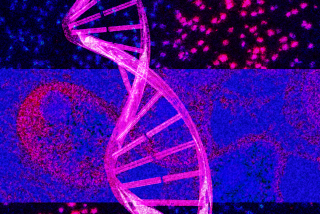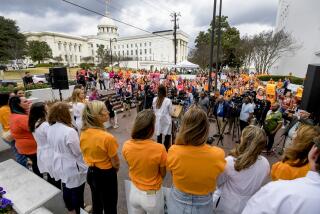Bill calls for DNA in every arrest
- Share via
Lawmakers in South Carolina are considering a bill that would create the nation’s most aggressive DNA collection program, instructing police to take genetic samples from people arrested in any crime -- including misdemeanors such as shoplifting -- and enter them into state and national DNA databases.
Every state collects DNA from people convicted of murder or sex crimes; 44 states, including South Carolina, take samples from all convicted felons. Six of those 44 states, including California, have approved taking samples from people arrested on suspicion of certain crimes. States maintain their own DNA databases, which are linked to form the national network.
But South Carolina, if it enacts the bill, would be the first requiring a DNA sample from anyone arrested in any crime, said Lisa Hurst, a Washington, D.C.-based consultant with DNAResource.com, a lobbying firm that tracks DNA database laws by state.
Civil libertarians say it would trample on privacy rights.
Barbara Joslin, a board member of the American Civil Liberties Union of South Carolina, said the state should have no right, for example, to take genetic samples in a white-collar case in which DNA doesn’t play a role.
“If DNA evidence is not part of the crime, then taking DNA samples from the suspect isn’t helpful,” she said. “It becomes an invasion of privacy.”
Jack King, a staff lawyer with the National Assn. of Criminal Defense Lawyers, said governments could be tempted to use genetic information they collected for other purposes -- and “nothing reveals more about a person” than DNA.
“There’s so much they can do,” he said. “You can’t trust the government not to misuse a tool that they have.”
The South Carolina bill’s sponsors -- five Republicans and two Democrats -- said it had a good chance of passing constitutional muster and becoming law.
They said suspects found not guilty could petition to have their genetic information expunged from the databases.
State Sen. Gerald Malloy, a Democrat, said the DNA collection was “minimally invasive” and “an opportunity to go into a new scientific arena to take advantage of it.”
State Sen. Jake Knotts, a Republican, said that expanding DNA databases would not only help solve crimes but perhaps help identify those wrongfully convicted. “It’s the fingerprint of the future,” Knotts said. “The DNA test is the most accurate test we have now.”
Tania Simoncelli, a science advisor with the ACLU national office in New York, said there had been an “extraordinary expansion of the banking and mining of DNA for law enforcement purposes” in the last 15 years.
She said DNA databases stripped affected people of the presumption of innocence and impinged on their 4th Amendment right to be protected from unreasonable searches, among other legal rights.
When she learned details of the South Carolina bill Wednesday, she described it as “outrageous.”
In 2004, California voters passed Proposition 69, which greatly expanded state DNA collection. Before, samples were taken from offenders convicted of any of 36 serious felonies; today the law mandates samples from all convicted felons and people arrested on suspicion of murder or certain sex offenses.
California’s law is scheduled to expand in 2009 to collect samples from anyone arrested on suspicion of a felony or certain misdemeanors.
The ACLU unsuccessfully challenged the first phase of the law in court; it expects to challenge the 2009 provisions when they take effect.
More to Read
Sign up for Essential California
The most important California stories and recommendations in your inbox every morning.
You may occasionally receive promotional content from the Los Angeles Times.










